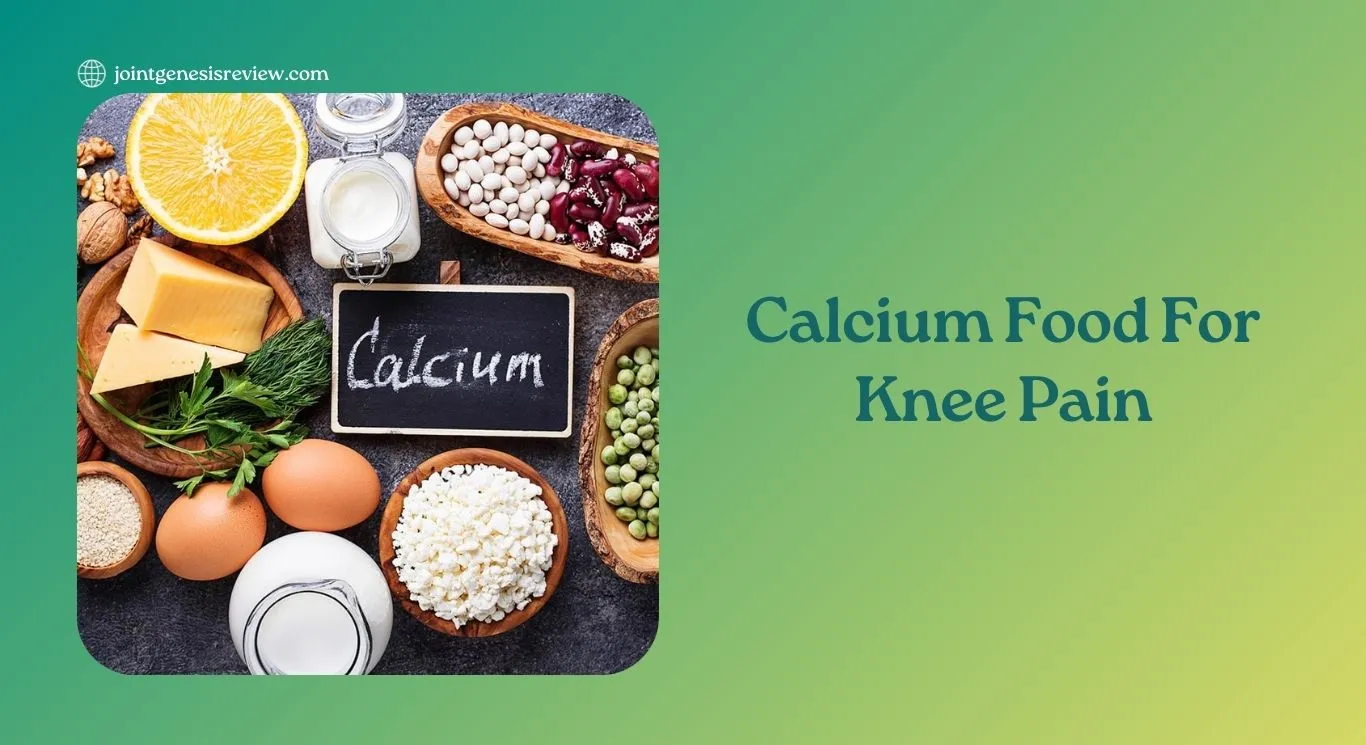Calcium-Rich Foods For Knee Pain: A Guide To Joint Health
Consuming calcium-rich foods like dairy products, leafy greens, and fortified foods can help maintain bone health and support joint function, potentially alleviating knee pain associated with bone-related conditions.

Disclaimer: This article has been generated with the assistance of AI tools. While our research team has fact-checked the content, readers should independently verify information for accuracy and reliability.
Calcium is essential for bone and joint health, playing a significant role in maintaining strong bones and supporting the structural integrity of the knee joint. If you’re experiencing knee pain, increasing your calcium intake may help reduce discomfort and prevent further joint degeneration. This article explores the best calcium food for knee pain to include in your diet to support knee health and alleviate knee pain.
Why Calcium Is Important for Knee Health?
Calcium is a crucial mineral that helps build and maintain strong bones. It plays a central role in bone density, and a deficiency in calcium can lead to weakened bones, increasing the risk of fractures and joint pain. In the context of knee pain, adequate calcium intake can help support the knee joint, reduce inflammation, and improve overall joint function.

According to the National Institutes of Health (NIH), adults should aim for a daily calcium intake of 1,000 to 1,200 milligrams, depending on age and gender.
Best Calcium-Rich Foods for Knee Pain
To ensure you’re getting enough calcium to support knee health, consider incorporating the following foods into your diet:
1. Dairy Products
Dairy products are among the richest sources of calcium. Including these in your diet can help support bone health and reduce knee pain.
- Milk: A single cup of milk can provide approximately 300 milligrams of calcium. Choose low-fat or skim milk for a healthier option.
- Yogurt: Greek yogurt is a great source of calcium and also contains probiotics that can benefit overall health.
- Cheese: Cheese varieties like cheddar, mozzarella, and Swiss are high in calcium.
2. Leafy Green Vegetables
Leafy greens are a plant-based source of calcium and other essential nutrients. They are an excellent option for those who prefer non-dairy sources of calcium.
- Kale: Rich in calcium and other vitamins, kale can be added to salads or smoothies.
- Spinach: Although high in calcium, spinach contains oxalates, which can reduce calcium absorption. It’s best to combine it with other calcium-rich foods for optimal benefit.
- Collard Greens: A single cup of cooked collard greens contains around 250 milligrams of calcium.
3. Fish with Edible Bones
Fish with edible bones are another excellent source of calcium. These can be a great addition to your diet to support knee health.
- Canned Sardines: Sardines with bones are high in calcium and also provide omega-3 fatty acids, which can help reduce inflammation.
- Canned Salmon: Like sardines, canned salmon with bones is rich in calcium and provides heart-healthy omega-3s.
4. Fortified Foods
Many foods are fortified with calcium, making them a convenient source for those who don’t consume dairy.
- Fortified Non-Dairy Milk: Almond milk, soy milk, and oat milk are often fortified with calcium, providing a dairy-free option.
- Fortified Orange Juice: Some orange juices are fortified with calcium, but be mindful of the added sugar content.
- Fortified Cereals: Certain breakfast cereals are fortified with calcium and other essential nutrients.
5. Nuts and Seeds
Nuts and seeds can provide additional calcium to your diet, contributing to better knee health.
- Almonds: Almonds contain calcium and healthy fats, making them a nutritious snack.
- Sesame Seeds: These seeds can be sprinkled on salads or added to smoothies for an extra calcium boost.
Additional Tips for Knee Health
While increasing your calcium intake is crucial, there are other factors to consider for overall knee health:
- Vitamin D: Ensure you’re getting enough vitamin D, as it helps with calcium absorption. Exposure to sunlight and consuming foods like fatty fish can boost vitamin D levels.
- Regular Exercise: Engage in low-impact exercises like swimming, cycling, or yoga to strengthen muscles and support knee joints.
- Maintain a Healthy Weight: Excess weight can put pressure on the knees, exacerbating pain and discomfort.
- Try to include safe supplements for joint health in your daily routine.
Conclusion: Calcium Food For Knee Pain
Incorporating calcium-rich foods into your diet is an effective way to support knee health and reduce knee pain. Dairy products, leafy green vegetables, fish with edible bones, fortified foods, and nuts and seeds are all excellent sources of calcium. Combine a balanced diet with regular exercise and proper vitamin D intake for optimal joint health. If you have persistent knee pain, consult with a healthcare professional for personalized advice and treatment options.
References:
- “Calcium: Fact Sheet for Consumers,” National Institutes of Health, available at https://ods.od.nih.gov/factsheets/Calcium-Consumer/.
- “Calcium and Vitamin D: Important at Every Age,” National Institutes of Health, available at https://www.bones.nih.gov/health-info/bone/osteoporosis/bone-health-for-life/health_guide/ca-and-vit-d-important.
- “Bone Health,” Centers for Disease Control and Prevention, available at https://www.cdc.gov/ncbddd/bonehealth/index.html.
Alex Milan
Alex Milan is a licensed osteopath and acupuncturist based in United States. He graduated from the British School of Osteopathy in 2017, where he received extensive training in osteopathic techniques for treating musculoskeletal conditions. Alex is passionate about providing patients with holistic, drug-free pain relief and enabling people to live active, healthy lives. He utilizes osteopathic manipulative techniques along with acupuncture and lifestyle advice to address the root causes of pain and dysfunction in the body. With expertise in areas including sports injuries, back and neck pain, headaches, and repetitive strain injuries, Alex has helped numerous patients find relief from pain and return to their regular activities.
